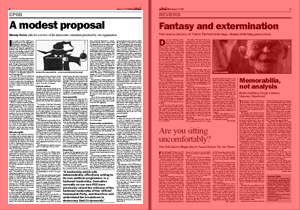 Papers: Weekly Worker: A modest proposal
Papers: Weekly Worker: A modest proposal Papers: Weekly Worker: A modest proposal
Papers: Weekly Worker: A modest proposal Click above to turn pageFirst and foremost, I must apologise to expelled CPGB member John Pearson.
Click above to turn pageFirst and foremost, I must apologise to expelled CPGB member John Pearson.
He was kicked out during a six week lull in my party work (through my recurring depressive illness), and so I missed the relevant meetings. In the article below, based on the account I got from the CPGB, I expressed support for that expulsion. It was idiotic of me not to hear his side of the story first, and makes me wonder about the subtle ways tribalism is intensified by small groups, as naturally their members talk more to each other than to anyone else. In any event, having experienced the pressure applied to dissenters since writing this piece, I now believe that John was forced into an impossible position.
The leadership, the 'Provisional Central Committee', effectively IS the CPGB. The rest of the membership pay subs, write articles, and sell the paper, but its policy is determined by a small committee. It was my aim to make this committee function accountably, and thereby return control of the party to the whole membership.
I had expected to be told that the committee already functioned accountably, but one PCC member took a more interesting line. He asserted that the PCC was indeed the whole party, and that this was correct as a point of principle. This bizarre and Orwellian piece of doublethink I initially dismissed as merely part of our leadership's occassional delusions of greatness: there was an awful lot of posing going on for a group consisting of two dozen people and a computer running PageMaker. But the more I think about the state of the left, the more it dawns on me that the deathly embrace of bureaucratic centralism they are all in is not a sad failure to apply Leninism, but intrinsic to Leninism itself. I might have got there sooner if I'd read Luxemburg.
Click here to download Weekly Worker issue 511.
 Demand for accountability -
Demand for accountability -
or just anarchist bomb throwing?Manny Neira calls for a review of the democratic centralism practised by our organisation
In a couple of weeks I shall be proposing a motion to the aggregate (or all-members' meeting) of the Communist Party of Great Britain which, if passed, will bring the organisation to its knees. This, at least, is the view of at least one of our leading comrades. It will "prevent the leadership from acting", and reveals me to be an anti-communist, an "anarchist".
You may be wondering what extreme, undisciplined and individualistic innovation has attracted such severe judgement. The gist of my proposal is that our Provisional Central Committee (or PCC) provides minutes of its meetings to members, including arguments supporting the decisions taken, and a regular item is added to our aggregate agenda for their formal approval.
Yes, that is all. If you are surprised at the reaction this proposal received, I must admit I was a bit too. In this article, I seek to explain why I am asking my comrades to adopt this procedure, allowing them a chance to decide for themselves.
Communists must organise democratically: this much I can surely say without descending into anarchy. Our most fundamental organisational principle must be the right of the majority to decide the programme and policy of the group.
Below I consider a number of issues arising from this, but none nullify this simple requirement. We are consistent democrats. We wish to see a genuinely democratic society. We believe that such a society - devoid of the distorted accumulation of power in the hands of the few which arises from our current division into classes based on capitalist economic relationships - will both respect the rights and freedom of each individual, and maximise the potential of humanity as a whole. We must begin by organising ourselves according to the same principles, and for the same reasons: because it is right, and because it works.
The rights of the majority should be constrained only by a proper respect for the remaining minority or minorities. It is essential that individuals or factions dissenting from the majority view should be able to challenge the majority, in order to test and so improve its methods, and highlight and correct mistakes. In short, dissent keeps us honest.
Such principled opposition is not merely a right, but a duty, and so we must create space for opposition to function. Minorities must not be silenced within or outside the group. Should they feel it necessary, dissenters should carry their discussion into the pages of the group's publications or even put out their own - all with the majority's consent and cooperation.
In fact, I think that the CPGB has a healthy, democratic culture in this respect. The publication of this article, advancing an argument so clearly (if, I still feel, bizarrely) opposed by the leadership, is a small example of the open debate for which I think the Weekly Worker has deservedly won a reputation. Genuine disagreements, both amongst our comrades, and between them and those of other organisations, appear in almost every issue. As a result, an awful lot of people read us.
Much of the left press is so dull as to be almost unreadable. The rigid imposition of a 'party line' makes them predictable and lifeless, with all the life and joy of a Stalinist five-year plan. They quickly become little more than internal publications: few outside the group publishing them read them, and some inside would rather not either. That our tiny group publishes a weekly paper read by thousands is both evidence and vindication of a policy of openness.
The rights of the minority, though, do not extend to simply ignoring the wishes of the majority. In order to act correctly, we must maximise the opportunity for debate and dissent. However, in order to act effectively, we must do it together. Once the group has made its decision, therefore, all comrades must implement it.
It is because of this that I reluctantly supported the recent decision to expel comrade John Pearson. He argued that he was bound by the decisions of Stockport Socialist Alliance over and above those of the CPGB: which raised the very natural question, why be a member of the CPGB if you are not free to implement its decisions?
The arguments surrounding the expulsion of comrade Pearson have been extensively reported in the Worker and it is not my intention to replay them here. However, such events should make us reflect. Was there any substance in his complaints? Are we sufficiently self-critical? Can we improve on our current practice? I think we would do well to learn everything we can from every problem we endure. Perhaps these proposals would have short-circuited some of John's arguments before they were even raised.
But ultimately, the expulsion was justified: we must have unity in action.
You do not have to be a Marxist dialectician to recognise the constant movement in all reality, and particularly in politics. Conservative prime minister Harold Macmillan was once asked to name the greatest political problem he faced, and famously answered: "Events, dear boy, events". In order to be effective, a communist organisation must be able to respond to these events, and it is simply not practical to assemble the entire membership to decide every question.
It is for this reason that we elect a leadership: in the case of the CPGB, our PCC. The leadership is a smaller group, and is therefore able to meet more frequently. It can also assign individual responsibilities to individual members, if even meetings of the PCC are too cumbersome to arrange in managing an area of work. These individually delegated comrades may be taken from its own number or the group as a whole.
In order to fulfil its role, the PCC is given the authority by the aggregate to speak for the group. This source of the PCC's authority is an important point. The comrades on the PCC are there solely because they have been elected by the aggregate, and any legitimacy they enjoy therefore derives from it. This principle is already recognised by the CPGB in the power it gives the aggregate to 'recall' some or all of the comrades on the PCC. However, I believe it could be reflected better and more realistically through an improved exercise of accountability - recognising that recall, like expulsion, is a power seldom used.
As the authority with which the PCC acts is derived from the aggregate, it is not free to simply do as it chooses. It is not an independent political body. Its proper role is defined by its objective relationship with the group. A leadership which acts independently, effectively writing to its own political programme, is a factional leadership. Comrades currently on our own PCC have previously raised the criticism of the factional leadership of the 'official' Communist Party, and therefore well understand the breakdown in democracy that it represents.
It is the role of the PCC to implement the programme and policy of the group as a whole. This is established by the party's printed programme, and by the votes of the aggregate.
In a sense this is just a special case of something I have already mentioned: unity in action. The minority may dissent from a decision, but once it is taken they must act in accordance with it. The PCC, in this respect, is no different. Were it to act against or regardless of the majority, it would simply be an undisciplined minority like any other.
To prevent this, the aggregate must hold the PCC accountable for its actions, and this in turn means that it must know what it is doing and why. Again, this principle seems to have had at least some recognition: the PCC used to circulate regular 'reports' of its meetings. However, it has not done so for some months.
To be fair, even my critics on the PCC have conceded that this was wrong and have committed themselves to restarting these reports, and so it may be that my arguments spur some improvement, even if my proposals are not passed.
In any event, it is essential that the information provided by the PCC to the membership is sufficient for their performance to be judged on its contents. This means that I shall be asking the PCC to distribute minutes which are both comprehensive and explanatory.
By comprehensive, I mean that they should not be restricted simply to those matters which the PCC requires wider party action, as I suspect the original 'reports' were. They must tackle even those issues which are left entirely to the PCC to manage. This comprehensiveness reflects the purpose of distributing the minutes: it is to ensure accountability, rather than simply communicate decisions.
By explanatory, I mean complete with explanations of the reasoning lying behind the PCC's decisions and actions. Members must know the reasons in order to judge if they believe them sound; and in any case, conclusions reported without supporting arguments may attract criticism which could be avoided if the reasons to back them up are documented.
Above all, the minutes should be distributed as soon as possible after the PCC meetings take place, and certainly before the next aggregate.
Finally, I am asking that an item is placed on the agenda of every aggregate seeking the formal approval of the minutes. This is a concretisation: it is both a symbol and a real-world action, establishing the responsibility of the membership to hold the PCC accountable for what it does in their name.
Taken in its entirety, this is my understanding of democratic centralism: democracy which combines open debate with united action, and leadership with accountability.
Democratic centralism is nominally the method of organisation of almost every group on the revolutionary left. Why, then, do we consistently fail to unite? Why is the left prone to constant fission into ideologically defined groups, when we have the mechanism to allow comrades to differ politically but act together? Democratic centralism remains a principle, as Shakespeare had it, "more honoured in the breach than the observance".
This breach is the failure of the whole left, and is of historic importance. The British working class now lacks any independent political representation. New Labour has dragged the Labour Party into being an overtly pro-bourgeois party. The Socialist Alliance failed to retain the affiliation of the Socialist Party; and even the pro-party minority within the SA failed to cooperate in resisting the SWP leadership's opportunist appetite for unprincipled alliance. I criticise the SWP leadership because I believe that many comrades within the SWP, and indeed inside many organisations or no organisation at all, retain a commitment to socialism and unity which is being strangled through the lack of democracy in our organisations.
The deformed, confused, undemocratic and deeply unpromising Respect coalition is ballooning into the vacuum left by the lack of working class representation, which New Labour no longer fills and no individual, ideological sect can fill. The CPGB is right to engage with Respect, because it represents the only space in which class-conscious politicians are congregating, but it represents a failure. Left groups who criticise it might reflect on the extent to which their own sectarianism helped to create the conditions in which some such coalition was inevitable.
The tragedy is, I have yet to meet a socialist who has not conceded in principle that, whatever the differences are between our groups, we could not work together within a genuinely democratic centralist formation: free still to argue their case, and even publish their papers, but acting together. If we are to forge Respect into a real workers' party, rather than merely watch disapprovingly as it degenerates into a petty bourgeois or even bourgeois-dominated front, we must move the defence of democratic centralism to the top of our agenda, metaphorically and (in the case of my proposal) literally.
Looking back over my words, I am still at a loss to identify the anarchistic deviationism I stand accused of. Did you spot it? Perhaps I should run a competition. Of course, this is a popular sport. The most frequent accusation traded between socialists is that the other guy is not a real socialist at all. The list of real socialists is generally defined as Marx, Engels, Lenin, sometimes Trotsky (according to the background of the speaker) and me. It is a wonder the movement has achieved anything, with so few genuine adherents.
Anarchists differ fundamentally from us in their belief in the spontaneously revolutionary nature of the working class, and this manifests itself in opposition to the formation of a revolutionary party. Anarchists also claim that parties are, by their internal logic, doomed to become undemocratic. I feel pretty comfortable that this is not the case I am making. We must build a revolutionary party, but, yes, that party must be democratic.
My experience of the CPGB leads me to believe that it has perhaps the healthiest democratic culture of any left group. I am troubled, though, when such a basic mechanism of accountability as I propose here is labelled 'anarchist'. I am troubled further when the PCC fails to produce minutes for months, not by the failure itself, but by the fact that it excited no comment from the membership. These are signs of a danger to the survival of that culture.
The danger arises not through a wilfully undemocratic or factional leadership, or even through bureaucratic centralist tendencies in our method, but simply through neglect. My aim is not to criticise the PCC, but to encourage an active sense of ownership of the CPGB by the membership, without which no leadership, however good, can maintain democracy.